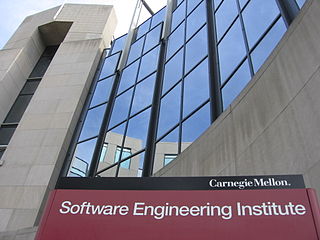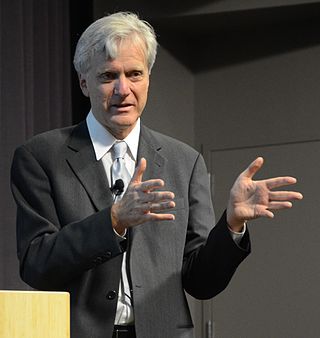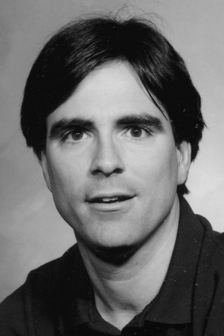Related Research Articles

Software Engineering Institute (SEI) is a federally funded research and development center in Pittsburgh, Pennsylvania, United States. Founded in 1984, the institute is now sponsored by the United States Department of Defense and the Office of the Under Secretary of Defense for Research and Engineering, and administrated by Carnegie Mellon University. The activities of the institute cover cybersecurity, software assurance, software engineering and acquisition, and component capabilities critical to the United States Department of Defense.

Carnegie Mellon University (CMU) is a private research university in Pittsburgh, Pennsylvania. The institution was originally established in 1900 by Andrew Carnegie as the Carnegie Technical Schools. In 1912, it became the Carnegie Institute of Technology and began granting four-year degrees. In 1967, it became the current-day Carnegie Mellon University through its merger with the Mellon Institute of Industrial Research, founded in 1913 by Andrew Mellon and Richard B. Mellon and formerly a part of the University of Pittsburgh.

The School of Computer Science (SCS) at Carnegie Mellon University in Pittsburgh, Pennsylvania, US is a school for computer science established in 1988. It has been consistently ranked among the top computer science programs over the decades. As of 2022 U.S. News & World Report ranks the graduate program as tied for second with Stanford University and University of California, Berkeley. It is ranked second in the United States on Computer Science Open Rankings, which combines scores from multiple independent rankings.

Dabbala Rajagopal "Raj" Reddy is an Indian-born American computer scientist and a winner of the Turing Award. He is one of the early pioneers of artificial intelligence and has served on the faculty of Stanford and Carnegie Mellon for over 50 years. He was the founding director of the Robotics Institute at Carnegie Mellon University. He was instrumental in helping to create Rajiv Gandhi University of Knowledge Technologies in India, to cater to the educational needs of the low-income, gifted, rural youth. He is the chairman of International Institute of Information Technology, Hyderabad. He is the first person of Asian origin to receive the Turing Award, in 1994, known as the Nobel Prize of Computer Science, for his work in the field of artificial intelligence.

Andreas Maria Maximilian Freiherr von Mauchenheim genannt Bechtolsheim is a German electrical engineer, entrepreneur and investor. He co-founded Sun Microsystems in 1982 and was its chief hardware designer. As of September 2023, his net worth is $11.2 billion.

Scott Elliott Fahlman is an American computer scientist and Professor Emeritus at Carnegie Mellon University's Language Technologies Institute and Computer Science Department. He is notable for early work on automated planning and scheduling in a blocks world, on semantic networks, on neural networks, on the programming languages Dylan, and Common Lisp, and he was one of the founders of Lucid Inc. During the period when it was standardized, he was recognized as "the leader of Common Lisp." From 2006 to 2015, Fahlman was engaged in developing a knowledge base named Scone, based in part on his thesis work on the NETL Semantic Network. He also is credited with coining the use of the emoticon.

Carnegie Mellon Silicon Valley is a degree-granting branch campus of Carnegie Mellon University located in the heart of Silicon Valley in Mountain View, California. It was established in 2002 at the NASA Ames Research Center in Moffett Field.
*Lisp is a programming language, a dialect of the language Lisp. It was conceived of in 1985 by two employees of the Thinking Machines Corporation, Cliff Lasser and Steve Omohundro, as a way to provide an efficient yet high-level language for programming the nascent Connection Machine (CM).

Red Whittaker is an American roboticist and research professor of robotics at Carnegie Mellon University. He led Tartan Racing to its first-place victory in the DARPA Grand Challenge (2007) Urban Challenge and brought Carnegie Mellon University the two million dollar prize. Previously, Whittaker also competed in the DARPA Grand Challenge, placing second and third place simultaneously in the Grand Challenge Races.

Luis von Ahn is a Guatemalan entrepreneur and a consulting professor in the Computer Science Department at Carnegie Mellon University in Pittsburgh, Pennsylvania. He is known as one of the pioneers of crowdsourcing. He is the founder of the company reCAPTCHA, which was sold to Google in 2009, and the co-founder and CEO of Duolingo.
The US National Virtual Observatory'-NVO- was conceived to allow scientists to access data from multiple astronomical observatories, including ground and space-based facilities, through a single portal. Originally, the National Science Foundation (NSF) funded the information technology research that created the basic NVO infrastructure through a multi-organization collaborative effort. The NVO was more than a “digital library”; it was a vibrant, growing online research facility akin to a bricks-and-mortar observatory for professional astronomers.
The Pittsburgh Supercomputing Center (PSC) is a high performance computing and networking center founded in 1986 and one of the original five NSF Supercomputing Centers. PSC is a joint effort of Carnegie Mellon University and the University of Pittsburgh in Pittsburgh, Pennsylvania, United States.
Ekaterini Panagiotou Sycara is a Greek computer scientist. She is an Edward Fredkin Research Professor of Robotics in the Robotics Institute, School of Computer Science at Carnegie Mellon University internationally known for her research in artificial intelligence, particularly in the fields of negotiation, autonomous agents and multi-agent systems. She directs the Advanced Agent-Robotics Technology Lab at Robotics Institute, Carnegie Mellon University. She also serves as academic advisor for PhD students at both Robotics Institute and Tepper School of Business.

Randolph Frederick Pausch was an American educator, a professor of computer science, human–computer interaction, and design at Carnegie Mellon University (CMU) in Pittsburgh, Pennsylvania.

Jaime Guillermo Carbonell was a computer scientist who made seminal contributions to the development of natural language processing tools and technologies. His extensive research in machine translation resulted in the development of several state-of-the-art language translation and artificial intelligence systems. He earned his B.S. degrees in Physics and in Mathematics from MIT in 1975 and did his Ph.D. under Dr. Roger Schank at Yale University in 1979. He joined Carnegie Mellon University as an assistant professor of computer science in 1979 and lived in Pittsburgh from then. He was affiliated with the Language Technologies Institute, Computer Science Department, Machine Learning Department, and Computational Biology Department at Carnegie Mellon.
Raymond J. Lane is an American business executive and strategist specializing in technology and finance. Lane is best known for assisting corporations with technology strategy, organizational development, team building, and sales and growth management.
Priya Narasimhan is a Professor of Electrical & Computer Engineering at Carnegie Mellon University in Pittsburgh, Pennsylvania. She is also the CEO and founder of YinzCam, a U.S.-based technology company that provides the mobile fan experience for a number of professional sports teams and leagues in the United States, Canada, Australia and New Zealand.

Rob A. Rutenbar is an American academic noted for contributions to software tools that automate analog integrated circuit design, and custom hardware platforms for high-performance automatic speech recognition. He is Senior Vice Chancellor for Research at the University of Pittsburgh, where he leads the university's strategic and operational vision for research and innovation.
Angel G. Jordan was a Spanish-born American electronics and computer engineer known as the founder of the Software Engineering Institute (SEI) and co-founder of the Robotics Institute at Carnegie Mellon University (CMU) and served on its faculty for 55 years, since 2003 as Emeritus. He was instrumental in the formation of the School of Computer Science (SCS) at Carnegie Mellon. He has made contributions to technology transfer and institutional development. He served as Dean of Carnegie Mellon College of Engineering and later as the provost of Carnegie Mellon University.
References
- ↑ The Computer World Smithsonian Awards, 1989–2001, Smithsonian Institution.
- ↑ staff, Computerworld (2001-04-10). "Computerworld Honors Program Recognizes Outstanding Heroic Achievements in Information Technology". Computerworld. Retrieved 2019-11-20.
- ↑ Computerworld Honors Program. (June 2002). Computerworld Smithsonian Program 1988-2002 : a Search for New Heroes. Boston, MA: Computerworld, Inc. OCLC 51557697.
Notes: June 2002 issue of the Laureate : Journal of the Computerworld Honors Program. -- Cover, p.[1].
- ↑ https://sirismm.si.edu/EADpdfs/NMAH.AC.0425.pdf [ bare URL PDF ]
- ↑ "Pittsburgh Supercomputing Center Wins Computerworld Smithsonian Award for Science". Archived from the original on 2013-01-03. Retrieved 2012-11-18.
- 1 2 3 4 "ComputerWorld Honors Website". Archived from the original on 2015-09-23. Retrieved 2012-11-18.
- ↑ "Carnegie Mellon University, Bio of Professor John O'Brien". Archived from the original on 2012-10-25. Retrieved 2012-11-18.
- ↑ Metro Toronto Police Computerworld Smithsonian Case Study "2005 Computerworld Honors Program". Archived from the original on 2013-07-25. Retrieved 2013-07-25.
- ↑ "Virtual Operating Room (Virtual-OR)". Computerworld Honors. Archived from the original on 2012-02-29. Retrieved 2012-05-07.
- ↑ Linda Rosencrance (June 8, 2000). "Technology innovators presented with Smithsonian awards". Computerworld. Archived from the original on 2012-10-09.
- ↑ http://www.cwhonors.org/Search/his_4a_detail.asp?id=3807 Royal Bank of Canada Dominion Securities, Computerworld Smithsonian Case Study Archived 2013-07-25 at archive.today
- ↑ "2005 Computerworld Honors Program". 2012-02-29. Archived from the original on 2012-02-29. Retrieved 2019-11-20.